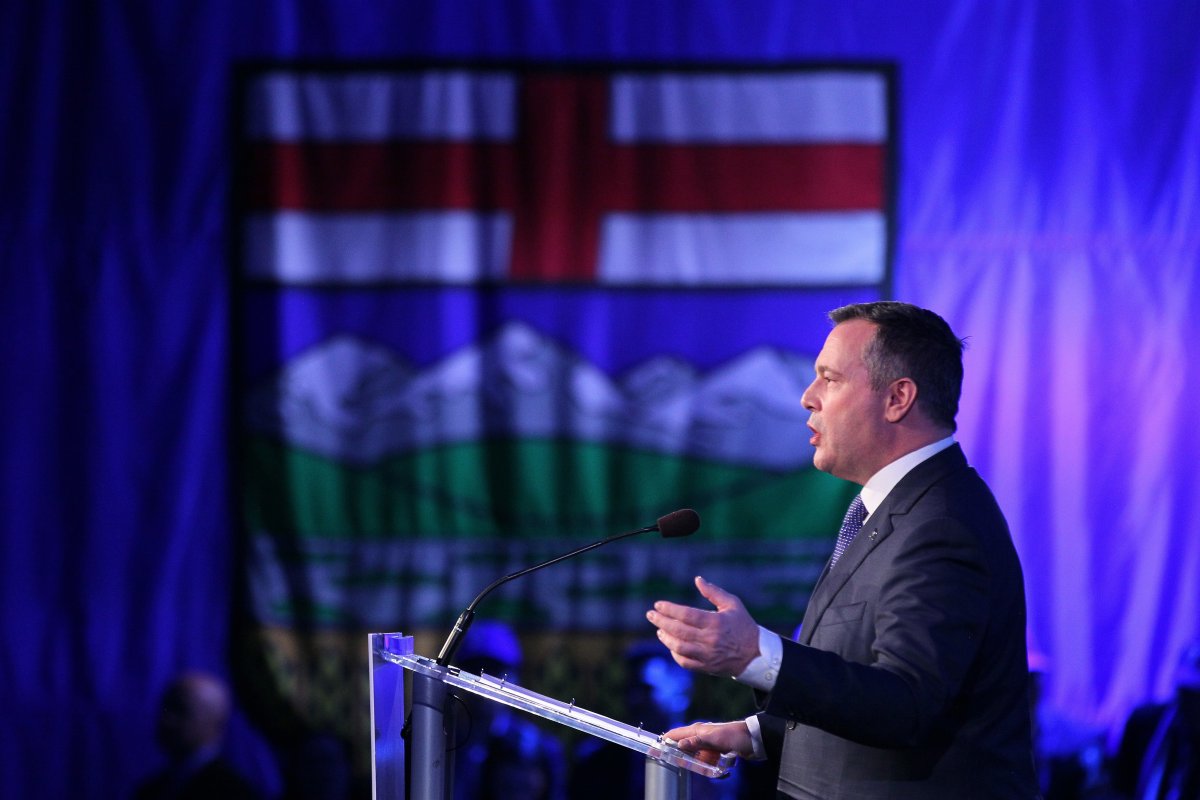Jason Kenney fired back at Moody’s Investors Service Wednesday after Alberta’s credit rating was downgraded the day before.

The international credit rating service had cited “a structural weakness in the provincial economy that remains concentrated and dependent on non-renewable resources — primarily oil — which causes volatility in financial performance, and remains pressured by a lack of sufficient pipeline capacity to transport oil efficiently with no near-term expectation of a significant rebound in oil-related investments.”
“Well I wouldn’t say that that one rating agency is the capital markets,” the Alberta premier told Danielle Smith on Global News Radio 770 CHQR.
“The bigger challenge we have is, increasingly, financial institutions — and this apparently includes Moody’s — are buying into the political agenda emanating from Europe, which is trying to stigmatize development of hydrocarbon energy. And I just think they are completely factually wrong.”
LISTEN: Alberta Premier Jason Kenney joins Danielle Smith for a year-end interview
According to Moody’s 2020 global credit forecast, they anticipated environmental, social and governance impacts to be one of six themes that will shape credit in the year to come.
Kenney said insurance companies like Switzerland’s Zurich Insurance Group are making decisions to no longer offer insurance products to Alberta oilsands operations because of “distorted, torqued data provided by green left pressure groups.”
In June, Zurich announced it would work with clients to reduce their exposure to oilsands, shale oil and thermal coal investments as part of a UN business pledge.
In April, Canadian insurer TD Insurance created an advisory board on climate change and extreme weather, with vice president Kenn Lalonde saying action was necessary to better insure the public and the industry.
Perceptions of election commissioner firing
Kenney was asked about the dismissal of election commissioner Lorne Gibson via Bill 22.
“Why’d you do that?”
“I don’t agree that it has the appearance of either of those things,” Kenney responded. “We did it because that was our public position. We oppose the NDP in creating a second, redundant, wasteful election bureaucracy.”
The omnibus Bill 22 passed through three readings in the Alberta legislature with time limits invoked on debate in just a week, during which Kenney was absent.
The former Alberta election commissioner levied more than $211,000 of fines in relation to the UCP leadership “kamikaze” campaign that eventually saw Kenney elected as party leader.
Mount Royal University political analyst Duane Bratt called the move “political interference” last month.
“This is just their cover story — that this is just an administrative move designed to save $200,000 a year in a $50-billion budget.”
Kenney expects federal carbon tax
During the wide-ranging interview with Danielle Smith, Kenney said he expects a federal announcement to come “very soon” about a carbon tax equivalency agreement on the UCP government’s TIER plan that levies major emitters.
“But I fully expect [the federal government] intend to plow ahead on Jan. 1, punishing Albertans for heating our homes and filling up our gas tanks.”
In June, Ottawa announced plans to impose a federal carbon tax on the province after the UCP government repealed the previous government’s provincial carbon tax.
Kenney said his government is supporting Supreme Court appeals made by Saskatchewan and Ontario over the federal carbon tax, and his government has its own judicial reference challenging the constitutionality of the carbon tax, to be heard in the next quarter.
“We believe we have a stronger case than our friends in Saskatchewan and Ontario precisely because of the strength of our TIER plan that gets us to 80 or 90 per cent of the emissions targets that the NDP government had,” Kenney said.
Relations with premiers, federal government
The Alberta premier said he found support from his fellow premiers at their recent meeting.
“We had basically three asks, three issues, plus a paragraph for the northern premiers. And it was one page and it was very focused, and two of the three focused on Alberta’s concerns.
“That was not an accident. That was I’ve been spending months even before the election, developing relationships with premiers across the country.”

Pharmacare, economic competitiveness and the fiscal stabilization program were the three issues the premiers were eager to address with the federal government.
Kenney said he sees “an opening” in the appointment of Chrystia Freeland as deputy prime minister and Minister for intergovernmental affairs.
“She and I had a three hour meeting. She seemed very on top of the issues, and open, open to hopefully some movement on these issues.”
Kenney also said he met with “key national business leaders” to propose investment into a national energy corridor.
“I’m not going to talk to you about details now because this is at an early and sensitive stage,” Kenney said. “But there is a very interesting project we’re working on that has First Nations buy-in, potential not major equity backers, about which I’m actually quite optimistic.”
Kenney feared that sharing any details would give a “heads up to the green left interest groups” that his government claims are behind the lack of investment in Alberta oil and gas.
Increasing rural RCMP
The Alberta premier also said his government is “doing exactly the right thing to move forward with a significant increase in the rural police contingent,” saying his government has heard frustrations from rural Albertans of extended wait times and escalating crime rates.
“When local communities sometimes have have raised taxes or put together more money to ask for additional RCMP officers, sometimes it’s taken upwards of two years for the RCMP to furnish those officers,” the UCP leader said.

Wednesday, Justice Minister Doug Schweitzer announced $286 million over five years for 500 RCMP positions in rural communities, the funds coming from municipalities, the provincial and federal governments under the Provincial Police Service Agreement.
Kenney and Smith discussed a number of other issues. Here are some of the premier’s responses:
- UCP government moving teacher pension assets to AIMCo in Bill 22:
“When you make decisions in budget, there are ultimately some of these things are subject to cabinet budget confidentiality.”
“This will save us a $42 million a year, and half of those savings go to the teachers.”
- UCP de-indexing of income tax brackets:
“It is temporary. Our platform has a commitment to do a tax reform panel towards the end of this term of government to look at how we can have the most efficient pro-job growth tax system in the country. And so I do hope we get back to indexation.”
“We have, by far, way, way more generous exemptions and credits than any other province. I think our basic personal exemption, it’s not over $18,500, which is huge, more generous than other provinces. That’s something we thought we had to pause to get to balance.”
- UCP government sending notices to nurse unions about possible job cuts:
“But it’s not necessary to reduce those positions if the unions come to the table in good faith and help us find savings. Help us to reduce perhaps some of the benefits that we give in Alberta that the private sector does not enjoy, that other nurses and other provinces do not receive.”
- The collaboration between Premiers Moe, Ford and Higgs on nuclear reactor development:
“Us, not having a nuclear industry, I guess they didn’t turn to us at first. But we’ve expressed our interest precisely because the drive for net zero emissions in the oil sands could be hugely advanced by both small nuclear modular reactors, which are increasingly economical.”
- The “Alberta fair deal” panel meetings with Albertans:
“Once they come back with that feedback, we’re going to do a deep dive on some of these ideas to see how feasible they are. Some of them might be unaffordable right now. Setting up an Alberta revenue agency would cost us money and, as you know, the province is broke right now. On the other hand, maybe you will have certain advantages.
“We will certainly do our due diligence and on really big things like a potential Alberta pension plan, we would ultimately go to the voters in a referendum to seek their approval.”
–with files from Phil Heidenreich, Heide Pearson and The Canadian Press.








Comments